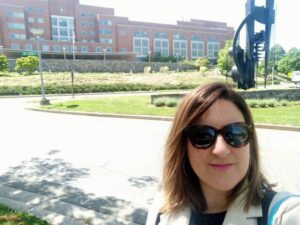Lucija Jurišić, a hematology nurse from the Institute of Hematology at University Hospital Centre Zagreb was given an opportunity at professional training in the USA in 2023.

bacc. med tech. Lucija Jurišić
After returning from professional training, we spoke with Lucija Jurišić about her experience.
Since I started working as a nurse at the Institute of Hematology at University Hospital Centre Zagreb in 2002, I knew that hematology as such would be a big challenge for me. Very quickly I felt in awe of everything I was learning from my senior colleagues and my daily practice.
As I have always been curious by nature, I constantly sought to know more about hematology. I carefully gathered most of my knowledge in working with transplant patients from older colleagues, from daily work with patients, participating in foreign congresses, and learning from foreign literature.After allogeneic transplantation, complications arise that create significant difficulties and problems for our patients (sometimes life-threatening), and one of them is cGVHD (chronic graft-versus-host disease). Such complications require daily and special care of the entire medical team. Therefore, in 2013, a team was formed at the hematology department at University Hospital Centre Zagreb to take care of late complications.
CGVHD after allogeneic bone marrow transplantation.
For this, in addition to the work of the doctor, the work of the nurse was also necessary; a nurse who has experience and knows how to recognize specific complications as well as the needs of patients.
The complexity of the treatment of hematological patients and their care requires constant and continuous education of the entire medical team, therefore, at the invitation of Prof. Steven Živko Pavletić, who works at the NIH (National Institute of Health), and with the generous financial assistance of the Ana Rukavina Foundation, I responded to a trip to their research center.
I spent a month in the educational program at the National Institute of Health NIH.
As part of the education, I was introduced to the process of working with hematology patients. From reception, through specific treatment methods, and to monitoring patients after transplantation. What I primarily wanted to see and learn were the specifics and differences in the medical care of hematological patients after allogeneic transplantation. The specificity of this clinical research center is that it has better and larger spatial conditions both for the stay of patients and for the work of the hospital staff, of which there is enough according to all WHO guidelines.
They also have all the necessary equipment for work so that the staff can carry out their practice without interruption.
From a nurse’s perspective, I was impressed by the independence and autonomous work of a highly educated and experienced nurse. Each nurse is independent within her competence and specialization (education, care, practical work, research, management).
What I am extremely proud of is that I saw that with our work we are not lagging behind such a renowned center despite significantly worse opportunities. Medical care and concern for hematology patients treated at University Hospital Centre Zagreb is at a high level thanks to the constant and continuous education of nurses, but also the closer relationship between the patient and the nurses.
I see and expect progress in the improvement of working conditions and the necessary specializations of hematology nurses. This is what is standard at NIH and we still lack it.
My one-month stay at the NIH was a unique experience for me. Seeing and experiencing work in one of the best clinical research centers was exciting and it was an opportunity for me to try to implement useful ideas in our daily work.I met many colleagues with whom I stayed in contact, which is very important to me because this way I will be able to exchange experiences and easily follow all the news in the development of hematology nursing care.
“Working at the Department of Hematology, working with patients with malignant diseases is not easy and not for everyone. Despite everything, I have never regretted that I chose this vocation and work in hematology”, concludes head nurse Jurišić, with a request to especially praise the colleagues with whom she works every day because, without a well-coordinated team, none of what she listed would be possible.
I thank the Ana Rukavina Foundation once again for the opportunity that I would not otherwise have had.
